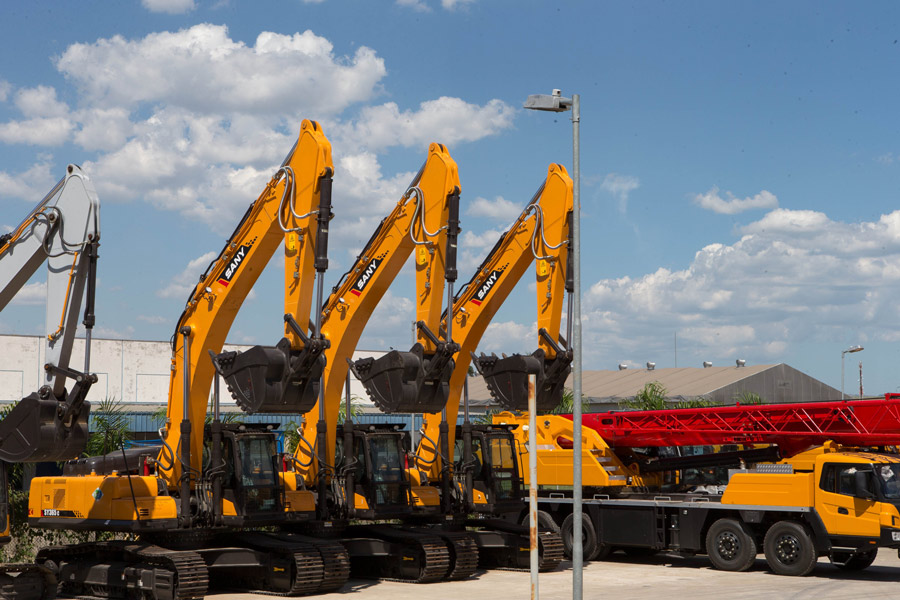Sany cracks Brazilian machinery marketplace
 |
|
Photo taken on in February shows machine shop trucks in Chinese multinational heavy machinery manufacturing company Sany in San Jose Dos Campos, Brazil. Chinese Sany Group has gained a proven track record in Brazil due to its localization strategy. Xu Zijian / Xinhua |
The construction industry in Brazil has been traditionally dominated by US, German and Japanese enterprises, but at least one Chinese firm, Sany Brazil, has managed to access the Brazilian construction machinery and equipment market by controlling costs and innovating.
In recent years, more Chinese enterprises have come to Brazil and many of them have been successful. However, some have failed to adapt to the Brazilian market. How can a company survive in such a large country which is different from China in many ways? Yuan Jinhua, the chairman of Sany Brazil gives his answer: become deeply rooted and utilize careful planning.
Near Brazil’s largest city Sao Paulo, the small city of Jacarei has become a factory base for two Chinese enterprises. Shortly after the establishment of Chery Automobile’s first car plant, Sany Brazil will build its plant there and become a neighbor of Chery.
In July, Liang Wengen, chairman of the Sany Group, signed an investment agreement with the Sao Paulo investment bureau. Under the agreement, Sany Group plans to invest about $300 million in Brazil to establish the new plant in Jacarei and to carry out the research and development and sales of construction machinery and equipment.
Sany Brazil is currently located at Sao Jose dos Campos of Sao Paulo State. Its new plant in Jacarei will cover an area of 560,000 square meters and is close to the Dutra highway which connects Sao Paulo and Rio de Janeiro. According to the plan, the first phase of the plant area is 50,000 square meters, and is expected to be put into operation in early 2016. By 2020, the entire plant area will reach 250,000 square meters, equivalent to 35 standard football courts.
In fact, Sany Group is not a stranger to Brazilian clients. Beginning in 2007, Sany Brazil has become an important supplier of construction machinery and equipment.
Yuan said that their development process in Brazil can be divided into four stages: the sales of imported Sany equipment from 2007 to 2009; initial development after a $200 million investment in 2010; assembly of excavators, lifting and concrete pumping machinery in 2011; a manufacturing phase that started in 2013 and finally after the 560,000-square-meter plant being built in Jacarei, Sany Brazil will be fully rooted in Brazil.
The 2014 FIFA World Cup and 2016 Olympic Games provide an unprecedented boom not only for Brazil’s construction equipment market, but also for Sany Brazil. In 2013, Brazil became the largest importer of Chinese truck cranes, totaling $140 million.
Yuan said that although European and American brands have been entrenched in Brazil’s construction equipment market for many years, Chinese crane enterprises have come from behind to currently occupy 85 percent of the local market of which Sany Brazil controls 37 percent and has been ranked first for two consecutive years.
In 2010, Sany’s Brazilian sales were only 200 million yuan ($32.6 million), but by building assembly lines and increasing investment, it enhanced the sales to 7.1 billion yuan in 2011 and 10.5 billion yuan in 2012.
Yuan expects that after the new plant is operational in early 2016, the annual production capacity of Sany Brazil’s large-scale construction machinery products will probably reach some 3,000 units while sales will increase to 20 billion yuan.
Despite having bright prospects, Sany Brazil also has had to develop what Yuan calls a sense of crisis.
“To achieve long-term business development, we must have a sense of crisis. Currently the macroeconomic situation in Brazil has fallen sharply and in the future it is bound to spread the crisis to the field of construction machinery and equipment. To manage the business, one should remove the so-called superfluous, and focus on the basic skills,” he said.
At the beginning of the year, Sany begins to calculate its product cost in order to find competitive advantages. “Sany Brazil’s crane market share is ranked first, but that share is mainly concentrated in the low end. Compared to European and American brands, Sany Brazil has a cost advantage, but the profit margin is not high,” said Yuan.
In the high-end crane market, Brazilian clients are still not willing to buy Chinese brands and instead opt for European and American brands. The same circumstance also happened in the market for excavators.
Brazil is very open in the field of construction machinery. From the mid-20th century, enterprises from the US, Japan and Germany have invested and built plants in Brazil. Compared to them, Sany, which came to Brazil seven years ago, looks like a younger generation.
“European and American brands have been in Brazil for many years and have much stronger influence. Chinese enterprises need long-term management and accumulation to penetrate and achieve long-term stable operation through leasing companies,” said Yuan.
In order to shorten the gap with foreign competitors, Sany Brazil pays attention to controlling costs, and to innovate more.
For China Daily


















